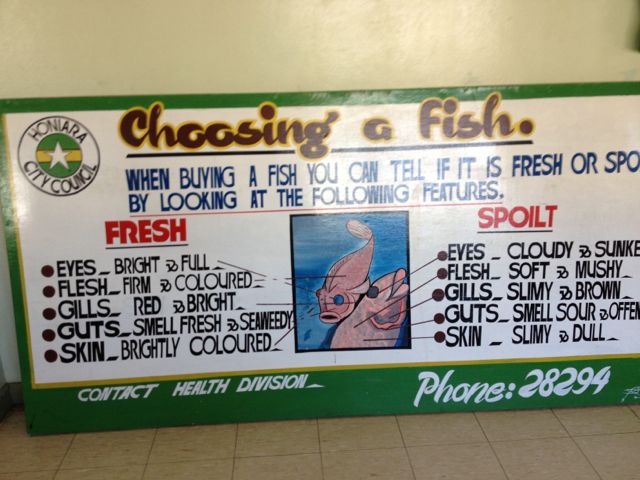“I fine Anna, for not saying hello to me on the street as I
ran past and waved.”
It is my second Rotary meeting in Honiara and I’m already being
held to task by the “Sergeant-at-Arms”. I put my money in the wooden basket and
make a face of shock, laughing the whole time. This section of the Rotary Club
of Honiara, is quite hilarious and was very new to me. Members shout out gripes
about each other and put a bill in the wooden basket, and the offender has to
put in the same amount. So you better be on your top game around town, never
snubbing a fellow Rotarian or drive to fast down the road, lest one of your
Rotary friends will note it and hold you to account at the coming meeting. It
is quite good fun, everyone laughing the whole time and throwing accusations
around the room, some slightly exaggerated, all for the benefit of the
Foundation fund.
 |
Outgoing President Sebastian Ilala
makes a speech |
I went to the Rotary Club my first few days in Honiara. It is a wonderfully boisterous, friendly and welcoming group. I feel so lucky to
be part of the Rotary family and have people interested in the Foundation’s
work to support Peace Fellows to study conflict in depth and spend time in
Applied Field Placements – the Rotary’s official name for what I’m doing here
in the Solomon Islands. I’ve always loved being Quaker because if I show up at
the Friends Meeting anywhere in the world I feel welcomed and connected to
those people. While Rotary is an enormous global organization and quite
different from a faith community, I have a similar sense of being welcomed and when
attending a club, instantly having a community of people willing to get to know
me and assist me, if need be.
The Rotary Club of Honiara meets at the Honiara hotel in a
room with lots of old photographs of 1960s movie stars machéed to the wall.
It’s a bit dark with a bar in an adjoining room, but on Tuesday night it is
brightened by the Rotary banners of many Rotary Presidents years and club
banners. The Club is in the evening and takes it’s time not like the 1 hour or
1.5 hour clubs at lunch or breakfast that I’ve visited so far in Indiana and
Sweden.
 |
Outgoing President Sebastian Ilala hands over
to incoming President Aldrin Bekala |
Here the club often spends Saturday morning unloading
containers of supplies for schools or medical facilities that have been
collected in other places and sent to benefit facilities and people in the
Solomons. The Club has a bunch of expats – mainly Australians - in addition to
Solomon Islanders. The beginning of July was the turn over of the Club
President to Aldrin Bekala from Sebastian Ilala. In Aldrin’s speech he said
something that I think well encompasses what I have come to appreciate about
Rotary:
“Being a Rotarian is not just about attending our weekly
meetings… It means accepting our communities as our responsibility.”
In the weekly speakers at Rotary Clubs, you hear for
community or state or business or visiting leaders. Talking about the work they
are passionate about. Identifying problems or solutions they are dedicating
their lives to and often through their fundraising or volunteer efforts, Rotary
clubs not only listen to these presentations for their education, but also take
action.
 |
| New Rotary Club of Honiara leadership team. |
I not only feeling incredibly lucky to have received such a
generous scholarship from this organization, but also to have been given a
window into people around the world working in small and large ways to change
the world for the better.
































